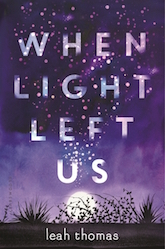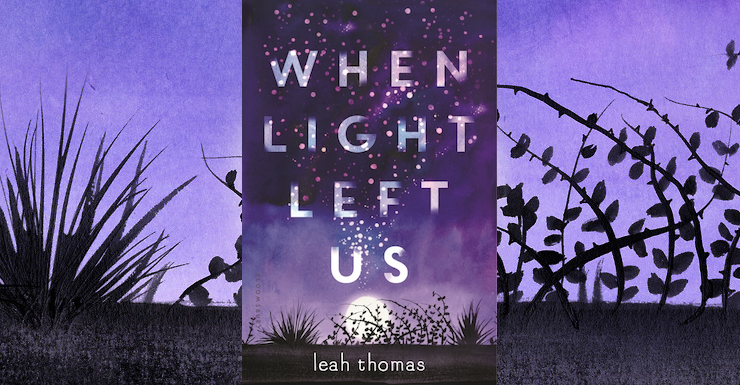We know (or can guess) how we’d react to an alien encounter—sci-fi has begged the question from War of the Worlds to Lilo and Stitch. But how would any of us deal with an alien leaving us behind?
Leah Thomas’ When Light Left Us picks up where family-friendly alien stories like E.T. and Close Encounters leave off: after the alien visitor has left the Vasquez family, after the hazmat tent has been cleared away, and after all the action—the great romance, the betrayal, the delight and wonder of a strange new world—has ended. Hank, Ana, Milo, and their mother Maggie don’t fade to black once their guest, a strange consciousness they call Luz, suddenly disappears. Sometimes, they wish they could. Instead, they do their best to figure out how to make lives in the holes that Luz left in his wake. For the Vasquez kids, this means relearning how to use the parts of themselves that Luz had (literally) possessed. And for Maggie, this means forgiving all those Luz-shaped holes, her own most of all.
Buy the Book


When Light Left Us
Told in split points of view, When Light Left Us unfolds like a disjointed memory. For one summer, Luz possesses the Vasquez children and makes them one creature, experiencing the world like they never had before. Gone are Hank’s messy feelings for boys (one boy in particular); with Luz, he is just his hands, finally as deft and sure in life as they are on the basketball court. Gone are Ana’s cutting and the void of her ex-best-friend; instead she is reduced to her eyes, watching beauty and kindness unfold like the cinematic masterpieces she wants to create.
And then there’s Milo. Like any good story about grief, the Vasquez’ loss of Luz is not an isolated incident. Instead, it is mapped onto a history of other losses: of friendships, of dreams, and perhaps most significantly, of the Vasquez father. One day, seemingly out of nowhere, Donovan Vasquez left Hank, Ana, Milo, and Maggie for the the most distant destination: his other family. Milo knows, though, without a doubt, that his father has returned when Luz appears: who else, after all, would know so much about them? Who else could bring them all so close together like this? With Luz, Milo finally has the answers whispered directly into his ears—to these, and to any other kind of question. What sound, he wants to know, do moth wings make?
For all that this summary has been about the summer of Luz, the real story of When Light Left Us is firmly in the present. Maggie, for one, had no idea her kids were possessed by an alien force until it was gone, leaving utter wreckage in its wake. Now, she has a kid whose hands don’t work, another that has taped her eyes open and unblinking, and still another that needs sound—constant sound, whether it’s the entire Radiohead discography, or his own screaming—to get through each day. Even knowing, thanks to the mysterious scientist that arrives at their door when Luz disappears, that alien possession is to blame, Maggie can’t help but wonder how she did this to her kids.
At its heart, When Light Left Us is a family story, but that family isn’t always traditional. The people that stand by the Vasquez kids are many and mighty: from strange scientists to exes to ASL teachers. Leah Thomas’ previous series, Because You’ll Never Meet Me, showed she has a flare for ensemble casts, but this time it’s contained to one novel. The world she writes into WLLU is huge—it implies, after all, that there’s life outside of our planet—but it’s confined, here, to one canyon, one house, and one little town. The Vasquez family may be at the heart of WLLU’s world, but their network of love, found family, and friendship is ultimately what keeps their stories moving, instead of ending the night that Luz disappears.
That said, the fact that so much of the action in the novel already took place makes the story move a bit slow. I understand why that might be a barrier for some readers—with major events being revealed instead of occurring, where is all of the dramatic tension, after all? But not only is the pay-off worth it (the climax, in real time, is every bit as exciting as Lux’s original arrival and departure), but also the strange pacing is fitting for a story about grief. Everything after a Traumatic Event is falling action: coping, surviving, and sometimes watching-paint-dry boredom. That’s one of the reasons stories about grief are so difficult to tell successfully. In traditional narratives, grief and trauma are endings, not beginnings. Thomas’ ability to make a story like this not only moving and emotionally rich, but action-packed and funny, makes her a genuine gift to her readers.
In this and her previous books, Thomas has pushed the envelope, and not just by including characters of color, queer and disabled kids, and fully-realized adults (though God knows YA could do with more of all of them), but also because her stories are weird. It’s a weirdness that doesn’t shy away from difficult subjects like trauma or loss, but it’s a hopeful kind of weird too. It’s a weirdness that makes the world feel big enough to contain alien life, for all the good and bad that might entail.
When Light Left Us is available now from Bloomsbury.
Emily Nordling is a library assistant and perpetual student in Chicago, IL.










